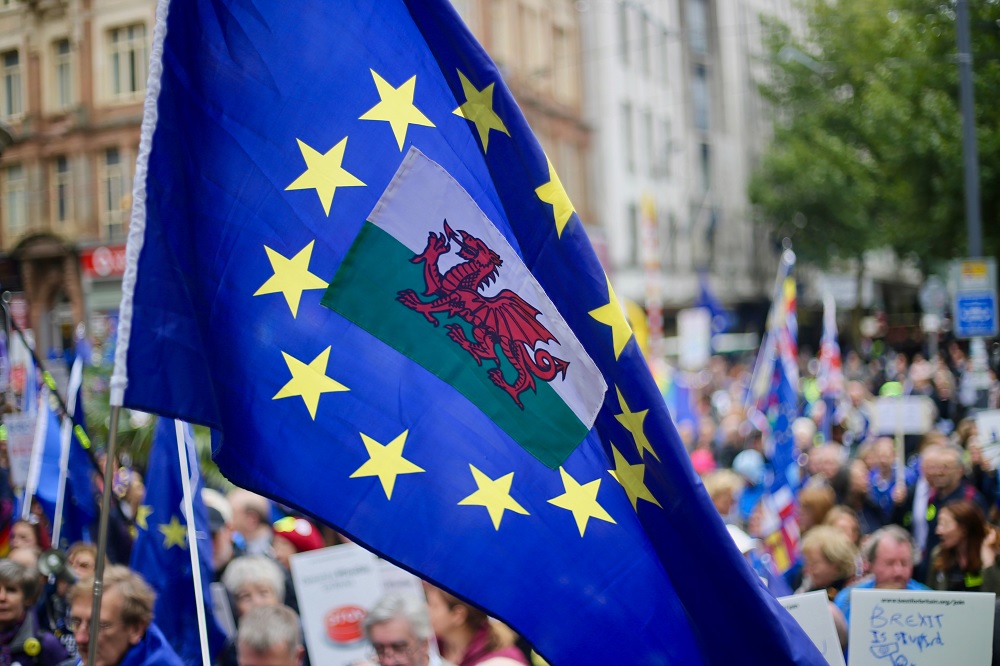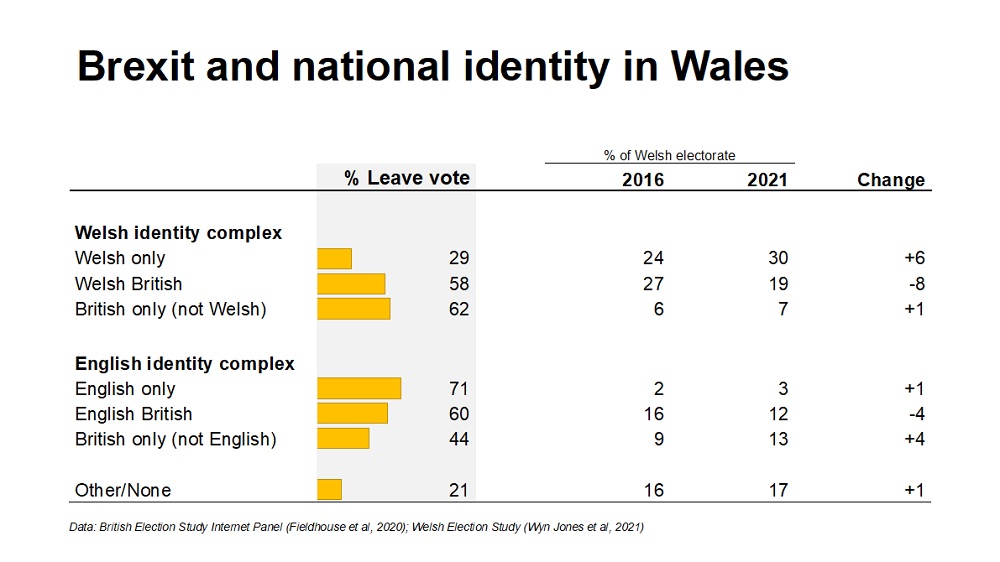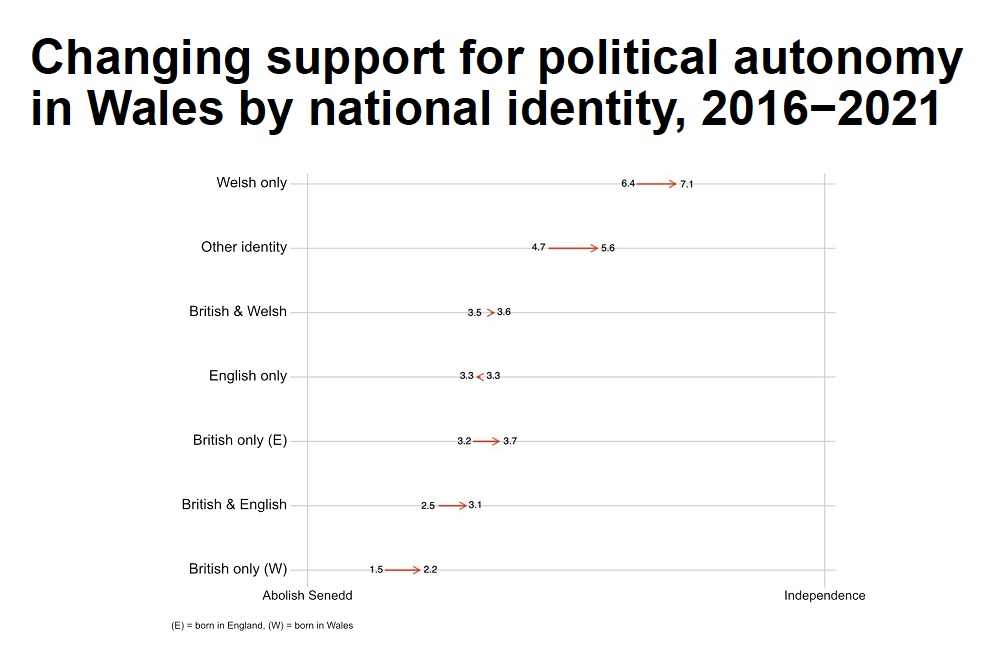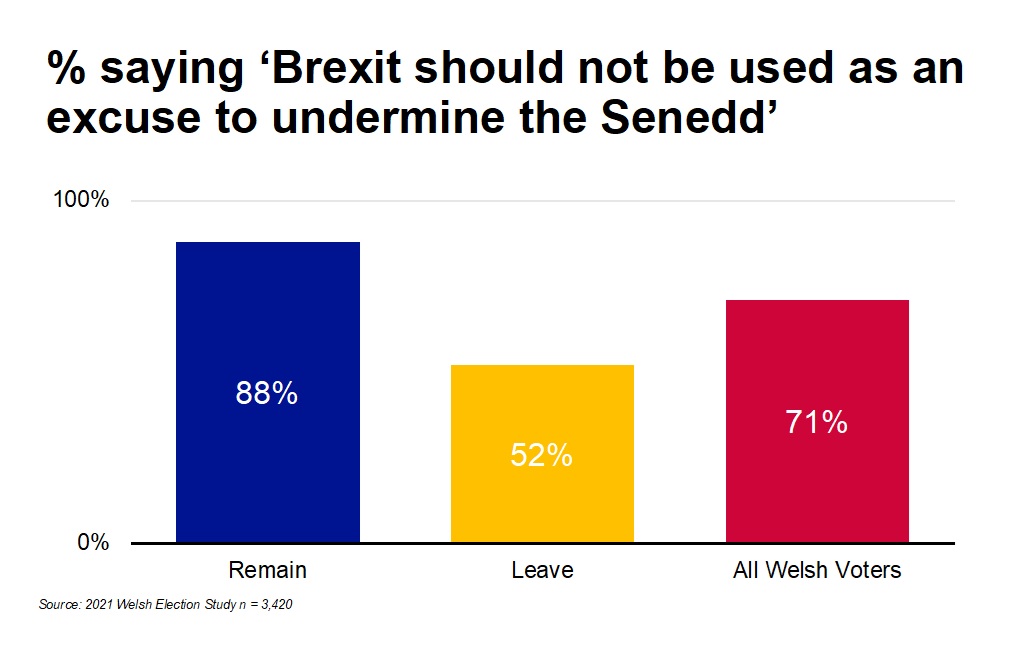How Brexit has changed our national identities and attitudes towards devolution in Wales

Richard Wyn Jones, Professor of Welsh Politics and Director of Cardiff University’s Wales Governance Centre
Even before the Brexit referendum it was clear that the fate of the external Union with Europe was linked to that of the internal Union that is the United Kingdom of Great Britain and Northern Ireland. John Major and Tony Blair warned explicitly that a vote for Brexit would destabilise the position of Northern Ireland and threaten the gains of the peace process. Meanwhile, Boris Johnson, in his at-the-time unpublished pro-Remain tract warned that “an English-only Leave vote could lead to the break-up of the union”.
In this, at least, all three Prime Ministers were correct: Brexit and, in particular, the ways in which successive UK governments have interpreted the implications of the referendum vote, has destabilised the internal Union. The high politics of this are obvious to all: the Northern Ireland Protocol and all that; new lows in the relationship between the central and devolved governments; and so on. But in what follows I want to dig a little deeper and focus on the ways in which Brexit appears to be impacting not only on attitudes but even on identities in Wales
Why Wales?
- Because we know that attitudes to Brexit in Wales were closely related to senses of national identity – as was indeed the case in the rest of the UK.
- Because we also know more generally that, in Wales, attitudes towards devolution are also closely tied to senses of national identity. Indeed, the same is true more generally of patterns of partisan choice in Wales, which explains to a significant extent why this year will mark the 100th anniversary of Labour winning every significant national election in Wales.
- As such, Wales seems like an ideal place to examine how these various dynamics potentially intersect with each other. And of course, Wales didn’t feature in those dire warnings about the potentially destabilising impacts of Brexit on the Union. So, to mangle Frank Sinatra, if it can happen there, it really can happen anywhere…
Let’s start by reminding ourselves of the relationship between national identity and attitudes to Brexit in Wales – something that will already be familiar to anyone who’s taken notice of our work over recent years.

Briefly, the two so-called ‘territorial’ identities that matter in Wales (Welshness and Englishness) were strongly correlated with attitudes towards Brexit, but in opposite directions. Welsh identity – like Scottish identity in Scotland – was significantly related to pro-Remain sentiment, with Welsh speakers tending to be particularly Europhile. Meanwhile, those who identify as English in Wales had very similar views to English identifiers in England itself – namely, they tended to be strongly Eurosceptic.
The impact of state-wide identity varied depending on which of the territorial identities it was interacting with. Those who felt both strongly British and strongly Welsh or who had a strong claim to Welsh national identity – e.g. were born in Wales – but chose to identify only as British, tended to be significantly more Eurosceptic than the strongly Welsh only (again, repeating a pattern observed in Scotland).
Meanwhile, those who felt both strongly British and strongly English or who had a strong claim to English national identity – e.g. were born in England – but choose to identify only as British, behaved in an almost identical fashion to the British English and the British not English in England. In the case of this latter group, this meant that they tended to be pro-Remain.
Public attitudes
That was then. What’s happened since?
First, note what’s happened to the size of the different identity groups. Over the past five years the proportions of the Welsh electorate identifying as strongly Welsh and strongly British or strongly English and strongly British, have fallen. In the former case to a pretty-striking extent. Meanwhile, the proportions identifying as Welsh only and British not English have increased, with the strongly Welsh only group now forming the largest identity group in Wales.
This raises an intriguing possibility.
Given that Brexit has been revealed ever more obviously as a national project – that is, a project that seeks to undergird and project a particular understanding of national past, present and potential future – to what extent have those who reject that national project also rejected the national identities most closely associated with it? After all, the United Kingdom context of (potentially) dual or nested identities means that most of us have options in this regard. It would certainly seem to be the case that it is Remainers who have shifted away from the dual identity categories in the direction of what is – for them – the most comfortable national ‘fit’.
And if this is what has happened in Wales, to what extent has something similar been replicated in the other four parts of the state?
Mention of a national project serves as a segue to attitudes towards devolution, support for which in the Welsh context has always been strongly correlated with national identity. In the aftermath of the 2016 referendum, it was widely assumed by partisans on both sides of the divide that the majority vote in favour of Brexit presaged a weakening in the public legitimacy of devolution. Indeed, some of you may recall that this is precisely the bet made by Wales’ right-wing populists ahead of May’s devolved election who shifted in a strongly devo-sceptic direction regarding this a natural extension of their previous Euroscepticism.
But as we can see, while there continues to be a strong relationship between attitudes towards the governance of Wales and national identity, the past five years have seen a general increase in support for autonomy across (almost) all identity groups in Wales, even if from very different starting points. Thus, even though Welsh devolution clearly remains a national project, and while there are those on both sides of the divide who view it as being locked in an existential contest with the national project that is Brexit, public attitudes are not so easily corralled. And this before we make any effort at all to factor Covid into our considerations…

The question remains, however, how will the electorate respond if the UK government continues on its current path, namely reducing the competencies of devolved government in core areas of activity like economic development in order to – as it would claim – secure the alleged benefits of Brexit? The most recent wave of the Welsh Election Study sought to explore this question directly. The results will surely make deeply uncomfortable reading for the Wales Office and Welsh Conservatives.
While it will come as no surprise that an overwhelming majority of Remainers reject the notion of reducing devolved powers in order to secure the benefits of Brexit, this view is also shared by a narrow majority of Welsh Leavers – and of course it’s 52%!

While abandoning the external Union with Europe was always going to raise fundamental questions for the internal Union of the United Kingdom, the ways that successive UK governments have chosen to interpret the 2016 mandate has only served to make those questions even more intractable.
Yes, even in apparently docile, Brexit-voting Wales.
Support our Nation today
For the price of a cup of coffee a month you can help us create an independent, not-for-profit, national news service for the people of Wales, by the people of Wales.






Benefits of Brexit? So far they pretty much amount to worthless things that we are told could not have happened if we were in the EU (passport colour, crown stamp on glasses etc), but which in fact could have happened when inside the EU. You cannot secure benefits (or even describe them) which don’t exist. The only real growth story since the referendum? Foodbanks, up over 130% since the referendum. The true Brexit success story.
Some benefits of Brexit? No Borrelle or Leyen. EU needs to get democratic. Borrelle should resign after putting Poles, Slovaks and Bulgars in firing line. Macron only one anything like the real deal. Had thundering row with Putin yesterday! The good part? It lasted an hour and a half. Negative Brexit: grim dictatorship of England.
So what are these benefits? You state you will mention some some and then just write some stuff about European politicians.
There are NO benefits to Brexit. The only future benefits to Brexit would be if it became a delivery vector of full independence for the elder nations.
I think that this is an interesting piece of research. It clearly shows that the mood of the ‘Nation’ is changing towards greater support for more Devolution/Independence as the Brexit train crash unfolds. Nice to have some good news when almost all other news is dire.
Wales will suffer the greatest out of all the nations of the UK with Brexit. And we will soon find out when the Conservative cloak of Covid clears to see what fate awaits us. Our ports are suffering. Red Tape is stifling Welsh businesses. Wales has lost millions thanks to Whitehall who now fund and forcible administrate our once EU Structural Funding, this because we qualify thanks to decades of historical underinvestment & neglect by Westminster. And they say Wales benefits being part of this British Union, lol. We in Wales now see the rise in English Unionism where the… Read more »
Yes, The Ukraine and Wales are so similar.
We are struggling to be independent with a bully to its east (although for Ukraine this bullying is really violent war aggression) but still wanting to eliminate our country and incorporate it in theirs.
While the English and the Russian people are kept in the dark and told lies.
Both The Ukraine and Wales must be allowed to be independent and sovereign.
Wales’ Labour MPs have voted against stronger devolution and legislation to protect our democracy, time after time. The reality and irony is that their constituents, have flumoxed them twice , which shows just how out of touch they are: 1) they voted for Brexit 2) they want more powers for Senedd and also there is growing support for independence. It would be a logical step for those who supported Brexit to also support Welsh autonomy. After all they wanted their country back! The shenanigans of Westminster has also underlined the fact that the English parliament are not a superior form… Read more »